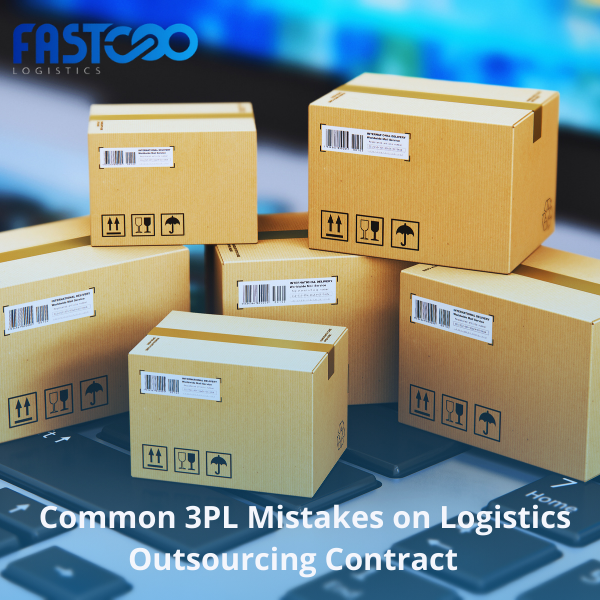4 Common 3PL Mistakes on Logistics Outsourcing Contract

Deciding to outsource logistics management or switch logistics partners is a scary thing, especially since in fact no one knows your product or customers better than you, but working with outside logistics sources can help you a lot in your business, especially since working with a 3PL partner It can give you time to focus on other, more important matters, such as the process of launching a new product, but unfortunately there are a number of mistakes people make when choosing a partner, and in this article we will show you 4 Common 3PL Mistakes on Logistics outsourcing contract.
What is third-party logistics (3PLs)?
If you hire an outside service provider for your logistical requirements, which service provider is called a third-party logistics provider, and in industry parlance, service providers are also referred to as 3PL.
Common 3PL Mistakes on Logistics Outsourcing Contract
There are a lot of common mistakes people make in contracts; here are the top 4 common 3PL mistakes when making a contract logistics outsourcing:
1. Having clear expectations
and i should say right from the outset that through your rft your rfp process you should be in the latter stages of that sharing the contract that you want the 3pl to be signing it’s the power of the draft it’s your opportunity to lay down exactly what you want and how it’s all going to work there are still lots of companies that don’t have contracts it’s surprising they have a rate card which basically says you know here’s our rates for providing different services but no actual contract.
it’s very important to have a contract because hopefully you never need to refer it to it very much but if something were to go wrong at least you can pull that out and see what was agreed probably more importantly though i think you see the requirement for a contract is to set up expectations so at least you and the other party are sitting down going through all of the elements of the relationship and it kind of sets things straight so number one is clear expectations about what well service what are the service needs that you have what are the service targets that you have so certainly you want some kpis in that contract.
2. Cost management
just a quick recap the types of rate structures you might have are unit prices so you know it’s a cost per pick per unit dispatched per order dispatch per order delivered whatever that might be less common are cost plus contracts where basically.
the 3pl says look we’ll resource the contract and whatever the cost of that is you’re going to pay plus a margin cost plus can work sometimes when you really are not sure about volumes and things like that but i was I would always say to people go for a unit cost so you want your rate structure in there how you’re actually going to be paying for the service.
what i often like to do as we’re developing the contract and this would happen through the rfp or rft process is really to get the 3pl’s responding with what they believe their costs are in in a fixed and variable way so if you imagine all of the fixed costs let’s say in operating and warehouse management there’s going to be the warehouse lease all of the all of the costs that are not impacted by the volume going through the warehouse so there’s going to be lease costs management overheads there’s going to be probably a base level of salaries and wages there’s going to be base level of maintenance so those are your fixed costs and then you’ve got the variable costs that rise and fall depending on the volume actually being processed through the warehouse.
so that could be additional labor overtime consumables all those sorts of things which are volume dependent i always like to see a contract costed with two buckets of costs the fixed and the variable and then quite often that allows you to actually put together a fee structure which says hey we’ll cover the fixed costs every month and then we’ll have a variable sort of unit cost to cover these other costs and that’s going to go up and down depending on volume so of course there’s many different ways to actually structure those contracts.
but that’s just an example of one so certainly number two cost management how are the rate structures going to work um talk about sort of rise and fall mechanisms so how will it be impacted by increases in labor costs and fuel costs and all those sorts of things, so you know who’s responsible for losses.
So we’ll allow a certain amount of damage and loss but of course that wants to be a minimal amount so all of those things are in cost management.
3. Continuous improvement
Number three is continuous improvement because whilst you are setting out with a certain service and cost in mind you should be encouraging the 3pl to improve that service and cost over time as well so it’s not just a static thing you know we’re not just paying five dollars a unit now and in five years’ time it’s five dollars a unit plus cpi we want to see that cost coming down that unit cost and we want to see the service going up perhaps and this is where you can have all sorts of incentives with the 3pl so that they can be gain sharing and so on so, continuous improvement really important.
4. How do you manage the contract?
How are you going to manage the contract? you do not outsource warehousing and transport and sort of throw the task over the fence now for the 3pl or the transport carrier to look after it for you have to manage the relationship how will that be managed who’s going to be who’s going to be managing it how often will performance reviews take place and what’s the agenda for those all of that can be mapped out during the rfp and rft process and actually put into the contract.
so have clear expectations, make sure that you have cost management very clear in the contract, make sure you have continuous improvement and make for sure you have a very clear framework about how that contract is going to be managed Thus you will be able to avoid those common mistakes in logistics outsourcing contract.




